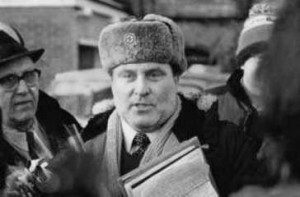[CONTENT REDACTED BY REQUEST OF THE AUTHOR]
Podcast: Play in new window | Download
[CONTENT REDACTED BY REQUEST OF THE AUTHOR]
Podcast: Play in new window | Download

 In the third program of An Hour by the Window, August discusses some aspects of the field of revisionism. He holds that revisionism’s principal antagonists can be divided into roughly two camps: Those that fall within the mainstream academic establishment and those that emerge within our own movement. He cites two examples, respectively, of each. Michael Shermer, Holocaust historian, embodies the former. Author Greg Johnson, a White nationalist, embodies the latter. Both fundamentally oppose Holocaust revisionism, but do so from very different points of view. The pro-establishment view rejects revisionism as pseudoscience, and the White nationalist rejection of revisionism rejects the revisionist enterprise as irrelevant to our cause.
In the third program of An Hour by the Window, August discusses some aspects of the field of revisionism. He holds that revisionism’s principal antagonists can be divided into roughly two camps: Those that fall within the mainstream academic establishment and those that emerge within our own movement. He cites two examples, respectively, of each. Michael Shermer, Holocaust historian, embodies the former. Author Greg Johnson, a White nationalist, embodies the latter. Both fundamentally oppose Holocaust revisionism, but do so from very different points of view. The pro-establishment view rejects revisionism as pseudoscience, and the White nationalist rejection of revisionism rejects the revisionist enterprise as irrelevant to our cause.
In the course of this program, August brings up other issues:
Image: Ernst Zündel leaving prison in 1985.
Email: worldswomb AT gmail DOT com
Podcast: Play in new window | Download
This is something everyone knows. Yet many people, and especially Whites, pretend at least some of the time that they don’t know who’s White, or equivalently, what White means. Worse, some pretend they do know, but that it means nothing or isn’t important to them.
The meaning of White is significant. It has existential, transcendental value for Whites.
Based on the negative, adversarial attitudes towards Whites and Whiteness reviewed in previous podcasts we could say Whites are:
Many Whites have internalized this negative view of Whiteness. But this is not satisfying. It’s not positive. It’s not healthy.
So who is White? The short answer is that White means European, people of European heritage. This begs the question: Who is European?
So a better understanding of Whiteness requires a deeper understanding of European history. But as we’ve seen, what is taught in government schools and corporate media is poisonously anti-White. What Whites need is a narrative and explanation which incorporates a racial understanding, recounted from a positive, sympathetic point of view.
I begin an exploration of this longer answer by reading a brief essay by Irmin Vinson, Racial Nationalism and the Aryans. The sub-title is, Who Were the Aryans?
The Aryans were semi-nomadic Nordic Whites, perhaps located originally on the steppes of southern Russia and Central Asia, who spoke the parent language of the various Indo-European languages.
Latin, Greek, Hittite, Sanskrit, French, German, Latvian, English, Spanish, Russian etc. are all Indo-European languages; Indo-European, or more properly Proto-Indo-European (PIE), is the lost ancestral language from which those languages ultimately derive. The “Proto” indicates that the grammar and vocabulary of this long extinct language, probably spoken up until 3000 BC, are a hypothetical reconstruction by modern philologists [philology = the study of literary texts and written records]. Just as Romance languages like Italian and Spanish derive from Latin, so Latin derives from PIE.
Indo-European philology traditionally used “Aryan” both to denote a people, understood racially or ethnically, and the language group itself (“Aryan speech”), irrespective of the race or ethnicity of the people speaking its various branches. In the wake of National Socialist Germany’s defeat, the term fell out of general scholarly use in both senses, and “Indo-European” (IE) became the preferred designation of the language group, “Indo-Europeans” of both the people who occupied the original Aryan homeland and their descendants, who gradually spread out across Europe, much of the Indian sub-continent, and parts of the Near East. Racial nationalists are not, of course, obliged to adopt the timid PC-lexicon of contemporary scholarship, but we should be aware of imprecision of “Aryan” as a racial or ethnic classification.
Arya, meaning “noble,” appears in various Indo-European languages. Its plural form (Aryas=”nobles”) was probably the name the Aryans used to describe themselves prior to their dispersal, and it may survive in Eire (Ireland) and certainly survives in Iran (Airyanam vaejo=”realm of the Aryans”). The discovery of thousands of such cognate words in widely separated languages, along with similar grammatical structures, led philologists to conclude, early in the nineteenth century, that most European languages had evolved from a common proto-language spoken millennia ago by a distinct people who gradually left their original homeland in a series of migrations, carrying their language with them.
The podcast will be broadcast and available for download on Tuesday at 9PM ET.
Podcast: Play in new window | Download
[CONTENT REDACTED BY REQUEST OF THE AUTHOR]
Podcast: Play in new window | Download